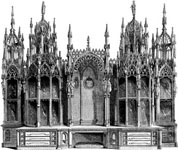
Is the Washington Cathedral Really “Our Nation’s Cathedral”?
GUEST COLUMN
The last gargoyle has finally been cemented into place on the Washington Cathedral (Episcopalian) in Washington, D.C. Under construction since 1907, it is a sublime achievement in architecture and art. But when the visitor reads in the brochure that this is “our Nation’s Cathedral,” he pauses. As one looks beyond the Beltway to the vast religious and cultural complexities of the country, the label appears dubious. Nevertheless, within the District of Columbia the label has attained a degree of establishment, teasing at times the touchy sensilla of the First Amendment.
There is no doubt that the Episcopal Church is a fixture of American history. Consider that in 1893 the U.S. Congress granted a charter to the Episcopal Church to establish a cathedral. To bolster its claim, that Church cited the words of Pierre L’Enfant: to build a “great church for national purposes.” The cornerstone at its laying was struck by a gold hammer once owned by George Washington, and President Theodore Roosevelt gave a short speech. In this church are buried President Woodrow Wilson and Secretary of State Cordell Hull. Funeral services have been held here for a number of high officials, including Dwight Eisenhower; and one dean of the cathedral (a grandson of President Wilson) was born in the White House.
In its efforts to maintain a high profile in Beltway circles, the staff of the cathedral seeks to align its programs with the public policy objectives of the “advanced” sector of the Washington elite, so the cathedral has sponsored a stream of politically correct speakers. Moreover, the Episcopalian diocese in which the cathedral stands boasts a number of priestesses, and clergy of various “sexual orientations.”
Even the Smithsonian Institution (though in its lecture halls one cannot discuss religion) published in its magazine a lengthy article about the cathedral. And so the church is emboldened to claim the title of “our Nation’s Cathedral” in its printed self-presentation, with nary a twitch from constitutional purists.
You May Also Enjoy
Many Anglo-Catholics who convert to the Roman Catholic Church are disappointed with what they find in the average Roman Catholic parish.
Many Anglicans breathed a deep sigh of relief when Archbishop Robert Runcie arrived at the…
The Prayer Book tradition might well assist the Church in welcoming home those who wander in exile.

